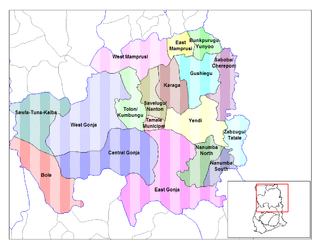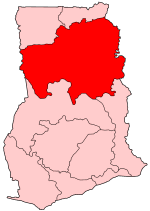
Yendi , is the traditional capital of the Kingdom of Dagbon and the administrative centre of the Yendi Municipal District in the Northern Region of Ghana. As of 2021, the population of Yendi was 154,421 comprising 76,142 males and 78,279 females. It is the seat of the King of the Dagbon, Ghana's oldest kingdom.

The Northern Region is one of the sixteen regions of Ghana. It is situated in the northern part of the country and ranks as the second largest of the sixteen regions. Before its division, it covered an area of 25,000 square kilometres, representing 10 percent of Ghana's area. In December 2018, the Savannah Region and North East Region were created from it. The Northern Region is divided into 16 districts. The region's capital is Tamale, Ghana's third largest city.

The Southeast Missouri Lead District, commonly called the Lead Belt, is a lead mining district in the southeastern part of Missouri. Counties in the Lead Belt include Saint Francois, Crawford, Dent, Iron, Madison, Reynolds, and Washington. This mining district is the most important and critical lead producer in the United States.

Zabzugu-Tatale District is a former district that was located in Northern Region, Ghana. Originally created as an ordinary district assembly in 1988, which was created from the former East Dagomba District Council. However on 28 June 2012, it was split off into two new districts: Zabzugu District and Tatale-Sangule District. The district assembly was located in the eastern part of Northern Region and had Zabzugu as its capital town.
Donimalai Township is a township in Bellary district in the state of Karnataka, India.
Mauritania's mineral sector was dominated by iron ore mining and beneficiation. Other mineral commodities produced in the country included cement, copper, gold, gypsum, petroleum, salt, and steel. The 'Ministère des Mines et de l’Industrie' was the Government agency responsible for enacting the Mining Code and for the coordination of all activities in the mining sector. The 'Direction des Mines et de la Géologie' was the entity responsible for promoting the mineral sector and for providing geologic and mining information to potential investors; the 'Direction des Hydrocarbures' was in charge of the development of the petroleum sector; and the 'Office Mauritanien des Recherches Géologiques' was the Government entity responsible for evaluating areas of mineral potential for exploration. The 'Société Nationale Industrielle et Minière (SNIM)' was responsible for iron ore production and benefciation.

Iron ore mining in Western Australia, in the 2018–19 financial year, accounted for 54 percent of the total value of the state's resource production, with a value of A$78.2 billion. The overall value of the minerals and petroleum industry in Western Australia was A$145 billion in 2018–19, a 26 percent increase on the previous financial year.

Zabzugu-Tatale is one of the constituencies represented in the Parliament of Ghana. It elects one Member of Parliament (MP) by the first past the post system of election. It is located in the Northern Region of Ghana. The current member of Parliament for the constituency is Jabaah John Bennam. He was elected on the ticket of the New Patriotic Party (NPP) and won a majority of 6,654 votes more than candidate closest in the race, to win the constituency election to become the MP. He succeeded Mohammed Jagrihad represented the constituency in the 4th Republican parliament on the ticket of the National Democratic Congress.
Zabzugu is a small town and the capital of Zabzugu district, a district in the Northern Region of north Ghana. It has a nucleated settlement and is less populated. Most of the people there are farmers, and their main produce is Yam.

Zabzugu District is one of the sixteen districts in Northern Region, Ghana. Originally it was formerly part of the then-larger Zabzugu-Tatale District in 1988, which was created from the former East Dagomba District Council, until the northeast part of the district was split off to create Tatale-Sangule District on 28 June 2012; thus the remaining part has been renamed as Zabzugu District. The district assembly is located in the eastern part of Northern Region and has Zabzugu as its capital town.

Tatale-Sangule District is one of the sixteen districts in the Northern Region of Ghana. It was originally part of the then-larger Zabzugu-Tatale District in 1988, which was created from the former East Dagomba District Council. The northeast part of the district was then split off to create Tatale-Sangule District on 28 June 2012; As a consequence the remaining part was renamed as Zabzugu District. The district assembly is located in the eastern part of Northern Region whose capital town is Tatale.

The mining industry of Liberia has witnessed a revival after the civil war which ended in 2003. Gold, diamonds, and iron ore form the core minerals of the mining sector with a new Mineral Development Policy and Mining Code being put in place to attract foreign investments. In 2013, the mineral sector accounted for 11% of GDP in the country and the World Bank projected a further increase in the sector by 2017.
Tatale is a commercial town in Tatale Sangule District in the Northern Region of Ghana. Layout of the town is part nuclear and part linear. Its inhabitants are diverse in ethnicity with the Basares who speak Ntcham as their official language being the majority. The only Senior High School in the district is Tatale Evangelical Presbyterian Agric Senior High School. Market day in Tatale occurs once a week and is attended by many people from both far and near communities including Togoles. The Zambarama people are frequent in the market center every week and the district is largely rural, with approximately 90% of the population engaged in local agriculture, hence subsistence agriculture is the economic norm in the Tatale Sangule district.

Zabzugu is one of the constituencies represented in the Parliament of Ghana. It elects one Member of Parliament (MP) by the first past the post system of election. The Zabzugu constituency is located in the Zabzugu/Tatale District of the Northern Region of Ghana.

Tatale-Sanguli is one of the constituencies represented in the Parliament of Ghana. It elects one Member of Parliament (MP) by the first past the post system of election. The Tatale-Sanguli constituency is located in the Zabzugu/Tatale District of the Northern Region of Ghana.
James Cecil Yanwube is a Ghanaian politician and member of the Sixth Parliament of the Fourth Republic of Ghana representing the Tatale-Sanguli Constituency in the Northern Region on the ticket of the New Patriotic Party. He is currently occupying a position as Tatale/Sanguli District chief executive in the northern region of Ghana.
Mohammed Jagri is a Ghanaian politician and a coordinator. He served as a member of parliament for the Zabzugu-Tatale constituency in the Northern Region.
John Jagri Kokpahi is a Ghanaian politician and a member of the Second Parliament of the Fourth Republic Representing the Zabzugu/Tatale Constitiency in the Northern Region of Ghana.
John Jagri Kokpahi is a Ghanaian politician and a member of the First Parliament of the Fourth Republic Representing the Zabzugu/Tatale constitiency in the Northern Region of Ghana.

East Dagomba District is a former district council that was located in Northern Region, Ghana. Originally created as an ordinary district assembly in 1975. However, on 1988, it was split off into four new district assemblies: Yendi Municipal District, Gushegu-Karaga District, Saboba-Chereponi District and Zabzugu-Tatale District. The district assembly was located in the eastern part of Northern Region and had Yendi as its capital town.








